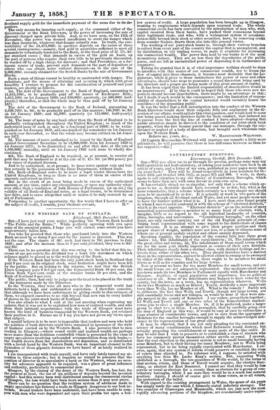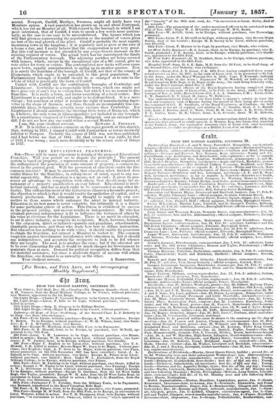C OSTRIBUTORY BOROUGH'S.
Lanrumney, Cardiff, 29th December 1857.
Sus—Will you allow me to go through the process, perhaps some may say half-egotistical and half-adulatory, of asking your readers to turn back to an article of yours, and a letter of my own, published in your pages more than six years back ? They will be found respectively in your numbers for Oc- tober 11th and October 18th 1851, at pages 971 and 996. I wish, in short, again to call attention to my old theory of Contributory Boroughs, which seems to have then met with some favour in your own eyes.
It has certainly struck me as singular, not only that a scheme which ap- pears to me so desirable should have occurred to so few, but, what is frx more remarkable, that a scheme which certainly is a very simple one should seem to be understood by so few. It is actually at work in two parts of the kingdom, through all Scotland and all Wales, and yet most people seem not to have the faintest notion what it is. I have more than once found people to whom I mentioned it confound it with the scheme of "electoral districts," which is its exact opposite. "Electoral districts" go on the notion of mere numerical representation—a member to so many head of electors, with, I imagine, little or no regard to the old historical landmarks of counties, cities, boroughs, and universities. "Contributory boroughs," on the other hand, are only another carrying out of the old English principle of com- bining local representation with some regard to the distinctions of classes and interests. It is an attempt to give their proper position and their proper share of weight, neither more nor leas, to a class of citizens some of whom are at present unduly exalted and others unduly depressed.
Speaking roughly, the population of the country falls into three great
classes : 1st, The inhabitants of the rural districts ; 2d, The inhabitants of the great cities and towns; 3d, The inhabitants of those small towns which are for the most part chiefly important as centres of their own districts. Their inhabitants clearly form a distinct class, with distinct feelings and in- terests from either of the other two. They should therefore have a distinct share in the representation, and not be allowed either to swamp or be swamped by either of the other two. That is, there ought to be members for small towns as well as for counties and kr large towns.
Now at present we have far too many Members for small towns, and yet
the small towns are not adequately represented. One moderate-sized mar- ket-town sends its two Members to Parliament equally with Manchester and Glasgow. Another, of equal population and importance, has no political existence at all. Some of its inhabitants may happen to have votes for the county, but the town, as a town, has no representation whatever. Wells elects two Members as much as Bristol,- Yeovil, decidedly a more important town than Wells, has no Member at all. What is the remedy ? Surely not to obliterate the fact that Wells and Yeovil, though not large towns, are still essentially towns and not villages, as would be done if they were sim- ply merged in the county of Somerset. I say rather, group them together ; let Wells and Yeovil and one or two other of the Somersetishire market- towns join to elect a single Member. Or, if it be preferred, make a larger group to elect two or three. I am persuaded, that by carefully going over the map of England in this way, it would be easy at once to enfranchise a large number of considerable towns, and yet to save from the aggregate of Members for the smaller boroughs enough to supply the acknowledged defi- ciency in the representation of our great cities. It may be objected, that I am not only pleading for the continued ex- istence of many constituencies which most Reformers would destroy, but actually proposing the establishment of many more of the like order. It may be said that I wish to preserve or to reestablish a class of electors who have too commonly proved themselves either servile or venal. I answer, that the real objected to the present system is not to small borougha having some Members, but to their having too many Members ; not to Wells being represented, but to its being equally represented with Manchester. I an- swer, again, that any system of reform would preserve or establish the class of voters thus objected to. No reformer will, I suppose, be satisfied with anything less than Mr. Locke King's motion. But, supposing Wells abolished as a borough, the ten-pounders of Wells would, by the terms of that motion, retain, and those of Yeovil would acquire, the elective fran- chise, as electors for East Somerset. I cannot see that they would be leas servile or venal as electors for a county than as electors for a group of con- tributory boroughs, while I am sure they would be in a much less natural position. Again, I should of course give to these voters, as to all voters, the protection of the ballot.
With regard to the existing arrangement in Wales, the space of six rare has simply made the ease wluch I formerly stated infinitely stronger. The two counties of Glamorgan and Monmouth, which are just now the most rapidly advancing portions of the kingdom, are scandalously under-repres
sented. Newport, Cardiff, Merthyr, Swansea, might all fairly have two Members apiece. A vast population has grown up in and about Pontypool, which has yet no Member at all. With regard to the borough in which I am most interested, that of Cardiff, I wish to speak a few words more particu- larly, as the case is one easy to be misunderstood. The figures which you will find given as representing the population or the number of voters gives no test of the real growth of the place. Cardiff is probably the most rapidly increasing town in the kingdom ; it is popularly said to grow at the rate of a house a day, and I really believe that the exaggeration is not very great. But this vast increase is not attended by any proportionate increase on the existing register of voters. The actual town has far outstripped the limits of the Parliamentary borough. The adjoining parishes are being covered with houses, which, except in the exceptional case of a 501. rental, give no vote either for town or county. The contemplated new docks will soon cause a new town, equally unrepresented, to spring up in another quarter. Now it is surely the franchise of the borough of Cardiff, not that of the county of Glamorgan, which ought to be extended to this great population. The Parliamentary borough of Cardiff should be so enlarged as to take in the whole of what is practically the town of Cardiff.
United with Cardiff are the contributory boroughs of Cowbridge and Llantrissant. Cowbridge is a respectable little town, which one might not have gone out of one's way to enfranchise, but which I see no reason to dis- franchise. It is really a town, and forms something of a local centre. But Llantrissant is a practical evil, and ought to be disfranchised. It is a mere village ; but somehow or other it retains the right of manufacturing fagot- votes in the shape of freemen, and thus, though an incomparably less con- siderable place, it furnishes actually more electors than Cowbnd,ge. For Llantrissant I should substitute the thriving little town of Bridgend, which is, I believe, the only town in Glamorg,anshire riot included in any borough. To a constituency composed of Cowbridge, Bridgend, and an enlarged Car- diff, I do not see how any one could refuse a second Member.
N.B. It is rather a curious comment on the rapid growth of this district, that, writing in 1851, I classed Cardiff with Carmarthen as towns decidedly inferior to Newport. Probably the census of 18.51 was not then published, and I had before me that of 1841. By that census I was right, by that of 1851 I was wrong ; much more decidedly so by the actual state of things in 1857.



































 Previous page
Previous page